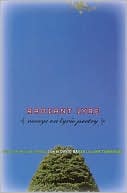In Journal of the Fictive Life, Howard Nemerov took a shot across the bow of lyric poetry, reminding poets of the skills required to avoid slipping into affectation. “Lyric poetry, just because of its great refinement, its subtlety, its power of immense implication in a confined space – a great reckoning in a little room – is perpetually in danger of preferring gesture to substance,” he wrote. “It thins out, it goes through the motions, it shows no responsibility. I conceive this responsibility of poetry to be to great primary human drama, which poets tend to lose sight of because of their privilege of taking close-ups of single moments on the rim of the wheel of the human story. The poet will improve his art who acknowledges the necessity of always returning to that source; he will fail who always writes another poem instead.”
 One of the many instructive and pleasurable aspects of Radiant Lyre is the notice paid to rhetorical statement as a way to add resonance and provocation to the lyric. Linda Gregerson meets this topic directly in “Rhetorical Contract in the Erotic Poem,” but others also touch on rhetoric. “To focus on rhetoric is to focus on the social premise that underlies all linguistic practice, to emphasize those aspects of language that constitute a series of tacit and explicit negotiations between speaker and audience,” she says. “For poetry, like public speaking, has a suasive agenda: the poem may affect the contours of solitary meditation or unfiltered mimesis, the recklessness of outburst or the abstraction of music, but it always also seeks to convince, or coerce, or seduce a reader.” The teachers of poetry represented in this collection continually steer the attention back to intentionality, as if sensitive to Nemerov’s complaint of irresponsibility.
One of the many instructive and pleasurable aspects of Radiant Lyre is the notice paid to rhetorical statement as a way to add resonance and provocation to the lyric. Linda Gregerson meets this topic directly in “Rhetorical Contract in the Erotic Poem,” but others also touch on rhetoric. “To focus on rhetoric is to focus on the social premise that underlies all linguistic practice, to emphasize those aspects of language that constitute a series of tacit and explicit negotiations between speaker and audience,” she says. “For poetry, like public speaking, has a suasive agenda: the poem may affect the contours of solitary meditation or unfiltered mimesis, the recklessness of outburst or the abstraction of music, but it always also seeks to convince, or coerce, or seduce a reader.” The teachers of poetry represented in this collection continually steer the attention back to intentionality, as if sensitive to Nemerov’s complaint of irresponsibility.
Commenting on the last poem of Neruda’s Twenty Poems of Love, Richard Jackson writes, “We understand there is a tension between the speaker and the poet … The poet’s knowledge of the speaker’s condition serves to deepen the emotion. This is an aspect of the lyric that often goes unnoticed or ignored, even denied by students who often see the effect of the poem in the theme per se, not in the artistry.” The editors devote an entire section of Radiant Lyre to “On Meditation and Mediation: The Problem of People,” knowing that a poet’s rapture with the lyric may obscure the reality of the squirming reader who seeks the context of the “other.” “The imagination takes from its sources, not the other way around,” notes Stanley Plumly in “A Place for People in Lyric Poetry.” “No poet, however manifest, is ever alone in his or her poem. Sonnets, elegies, odes, the textual landscapes of the love, grief, and thought as feeling: none of these forms are possible without other people, whether announced, alluded to, or acknowledged by their absence.”
Baker and Townsend built their book on a dual foundation. First, “Lyric Modes” examines the elegy, the love poem, and the ode. Two of Plumly’s essays excel here (“Elegaic” and “Between Things: On the Ode”), as well as fine pieces by Carl Phillips (“The Ode”), Gregerson and Jackson. Then, “Lyric Means” investigates the relation of the lyric to the pastoral (outstanding here is Eric Pankey’s “Meditative Spaces”), the sublime and beauty, people, and time. There are 25 essays in all. Radiant Lyre will be a useful and inspirational text for the poetry workshop instructor who may begin with Helen Vendler’s lyric definitions but wants to offer additional rich perspective to students. One is always choosing a lyric posture from among those already attempted. This book takes lively inventory of the available choices.
An earlier Graywolf Press book of essays, After Confession, Poetry as Autobiography (2001), has held up well over the past six years, now ostensibly a companion text to Radiant Lyre. Essays by Alan Williamson, Billy Collins and Louise Glück are especially noteworthy. There is also Claudia Rankine’s grandiose “The First Person in the Twenty-First Century” (oh, so that’s what we are now) with lines like “The languaged self, then, in order to keep itself human, in order to cohere, has to fragment.” Has to? Fortunately, Annie Finch weighs in with a more gracious and broadminded response in “Coherent Decentering.” More Rankine: “As fictionalized as the space of poetry and prose can be, I still feel the construction of a self must demonstrate a consciousness of its scriptedness.” Must? Of course it must. That’s what we used to call rhetoric.
[Published by Graywolf Press, 2007, $15.00, paper]